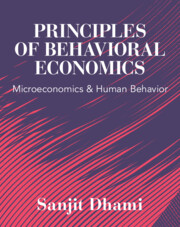8 results
Closing a mental account: the realization effect for gains and losses
-
- Journal:
- Experimental Economics / Volume 24 / Issue 1 / March 2021
- Published online by Cambridge University Press:
- 14 March 2025, pp. 303-329
-
- Article
-
- You have access
- Open access
- HTML
- Export citation

Principles of Behavioral Economics
- Microeconomics and Human Behavior
-
- Published online:
- 13 February 2025
- Print publication:
- 16 January 2025
-
- Textbook
- Export citation
10 - Bounded Rationality II
- from Part V - Bounded Rationality
-
- Book:
- Principles of Behavioral Economics
- Published online:
- 13 February 2025
- Print publication:
- 16 January 2025, pp 435-506
-
- Chapter
- Export citation
Why are gainers more risk seeking
-
- Journal:
- Judgment and Decision Making / Volume 8 / Issue 2 / March 2013
- Published online by Cambridge University Press:
- 01 January 2023, pp. 150-160
-
- Article
-
- You have access
- Open access
- HTML
- Export citation
Hedonic products for you, utilitarian products for me
-
- Journal:
- Judgment and Decision Making / Volume 11 / Issue 4 / July 2016
- Published online by Cambridge University Press:
- 01 January 2023, pp. 332-341
-
- Article
-
- You have access
- Open access
- HTML
- Export citation
Choices and affective reactions to negative life events: An averaging/summation analysis
-
- Journal:
- Judgment and Decision Making / Volume 3 / Issue 5 / June 2008
- Published online by Cambridge University Press:
- 01 January 2023, pp. 425-434
-
- Article
-
- You have access
- Open access
- HTML
- Export citation
Choosing victims: Human fungibility in moral decision-making
-
- Journal:
- Judgment and Decision Making / Volume 13 / Issue 5 / September 2018
- Published online by Cambridge University Press:
- 01 January 2023, pp. 451-457
-
- Article
-
- You have access
- Open access
- HTML
- Export citation
When being wasteful appears better than feeling wasteful
-
- Journal:
- Judgment and Decision Making / Volume 5 / Issue 7 / December 2010
- Published online by Cambridge University Press:
- 01 January 2023, pp. 489-496
-
- Article
-
- You have access
- Open access
- HTML
- Export citation

